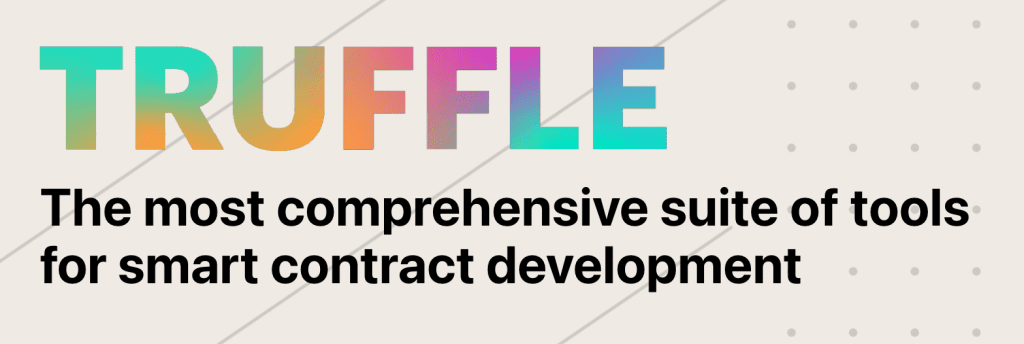
Blockchain Development Essentials: Truffle
Hey there, future blockchain whiz! Ready to turn those crypto dreams into code? 🚀 Let’s chat about Truffle – not the chocolate kind, but something equally sweet for your blockchain development journey.
What’s Truffle Anyway?
Imagine you’re building a LEGO masterpiece. Truffle is the box that not only contains all the pieces but also the instructions, tools, and even some neat stickers (aka your smart contracts, testing framework, and other development goodies) to make your blockchain project building as smooth as peanut butter.
In the blockchain world, Truffle is the go-to development framework for Ethereum, making it easier to develop, test, and deploy your smart contracts. It’s like having a magical toolbox that turns your ideas into real, working dApps (decentralized applications).
Installing Truffle: The First Step to Blockchain Brilliance
Before we roll up our sleeves, make sure you’ve got Node.js installed. It’s the bread to Truffle’s butter, essential for running JavaScript on your computer.
For the Mac Mavericks:
- Open your Terminal: Search for Terminal in your Spotlight and open it.
- Install Node.js: If you haven’t already, brew some code by installing Homebrew (a package manager for macOS). Paste
/bin/bash -c "$(curl -fsSL https://raw.githubusercontent.com/Homebrew/install/HEAD/install.sh)"in your Terminal and hit Enter. Then, brew install Node.js by typingbrew install node. - Install Truffle: Type
npm install -g truffleand watch the magic happen. This command globally installs Truffle, making it accessible from anywhere on your system.
For the Windows Wizards:
- Open PowerShell or Command Prompt: Search for either in your Start menu.
- Install Node.js: Head over to Node.js and download the Windows installer. Follow the steps, and you’re golden.
- Install Truffle: Type
npm install -g trufflein your PowerShell or Command Prompt. Boom! Truffle is now part of your coding arsenal.
Your First Truffle Project: A Step-by-Step Adventure
Let’s create a simple smart contract project to get our hands dirty. We’ll build a “Hello, Blockchain!” project because everyone starts with a hello, right?
Step 1: Crafting Your Project
- Open Terminal (Mac) or PowerShell/Command Prompt (Windows).
- Choose where you want your project to live and navigate there. Feeling lost? Just type
cdfollowed by the directory path. - Type
truffle init. This command creates a new Truffle project with all the necessary files and folders. It’s like unpacking your LEGO set and laying out all the pieces.
Step 2: Writing Your First Smart Contract
- Navigate to the
contractsfolder in your project directory. - Create a new file named
HelloBlockchain.sol. The.solextension is for Solidity, Ethereum’s programming language. - Open
HelloBlockchain.solin your favorite text editor and paste the following code:
// SPDX-License-Identifier: MIT
pragma solidity ^0.5.0;
contract HelloBlockchain {
string public message;
constructor() public {
message = "Hello, Blockchain!";
}
function updateMessage(string memory newMessage) public {
message = newMessage;
}
}This smart contract stores a message and lets anyone change it. Simple, yet a solid start!
Step 3: Compiling Your Masterpiece
- Head back to your Terminal or Command Prompt.
- Make sure you’re in your project’s root directory.
- Type
truffle compile. This turns your Solidity code into something the Ethereum network can understand. If all goes well, you’ll see success messages.
Step 4: Migrating (Deploying) Your Contract
- In your project directory, navigate to the
migrationsfolder. - Create a new file named
2_deploy_contracts.js. This file will tell Truffle how to deploy your smart contract. - Copy the following code into your new file:
const HelloBlockchain = artifacts.require("HelloBlockchain");
module.exports = function(deployer) {
deployer.deploy(HelloBlockchain);
};- Back in your terminal, run
truffle develop. This opens a Truffle console. - Type
migrateinside the Truffle console. This deploys your contract to the Truffle Develop network, a local testing network.
Step 5: Interacting With Your Contract
- Still in the Truffle console, let’s interact with your deployed contract. Type the following:
let instance = await HelloBlockchain.deployed()- Now, get the current message:
let message = await instance.message()
console.log(message)- Change the message:
await instance.updateMessage("Blockchain, meet Truffle.")- Check the message again to see the change:
message = await instance.message()
console.log(message)Voilà! You’re a Blockchain Developer Now
Congrats! You’ve just embarked on a fantastic journey. Like any grand adventure, the path is filled with learning, experimenting, and growing. Truffle is just the beginning. Dive deeper, build more, and who knows? Maybe you’ll be the one to develop the next big thing in blockchain.
Remember, every expert was once a beginner. So, keep coding, keep exploring, and most importantly, keep having fun. The blockchain world is your oyster!